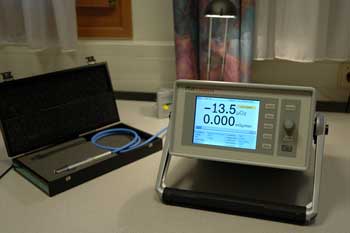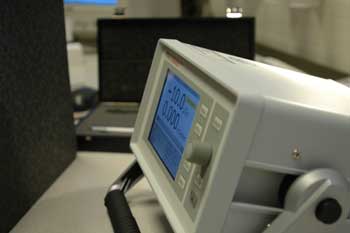

Jan.3, 2006: KFJ announces the acquisition of the first UNIDOSwebline in Austria (S/N 11).
Our new reference class dosemeter has some interesting features, some of them are shown below (click all images to enlarge). Check back for more experiences during usage!
After downloading the free VNC software from the PTW website and assigning an IP adress to the device, the UNIDOSwebline can be remote controlled over the network. In contrast to the RS232 mode, the dosemeter can also be operated locally while in VNC mode. Only one PC can connect to the device at a time.
The screenshot below displays the editing of the current web page on the left, and a live measurement, controlled via VNC viewer, on the right. The remote editing is also possible while the UNIDOS is in standby mode.
The
VNC viewer is simply another window on the desktop and gives full control
over the dosemeter. |
The question is: what sense does it make to remotely control a dosemeter? In radiation therapy, I think it helps when editing the configuration (detector library etc.). But it does not give me the alternative to perform linac QA from my office. But remember that the device may also be used for radiation protection purposes, where monitoring radiation levels may also be done whithout being present physically.
Here are some more screenshots from the VNC viewer:
Absorbed
dose to water is only one of several possible measuring quantities. |
A
live measurement without radiation. Resolution is below 0.5%, therefore
the "Low Signal" warning appears in yellow. |
UNIDOS
now has a configurable Autostart feature. |
Entry
of the chamber calibration factor. There are different password protected
security levels with different rights. |
Some
entries for a certain chamber. |
Self
tests can be done for the device and every detector. |
Zeroing
before detector test. |
Starting
the detector test. |
Detector
test running. |
Results
are compared to predefined values and are stored in the detector library.
|